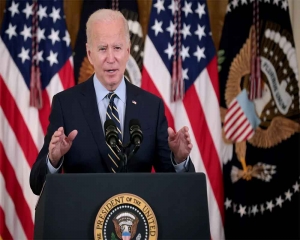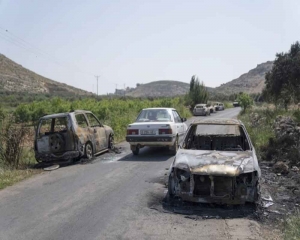Why do Americans in such large numbers continue to support the Don? Could it be the search for security that drives them?
What explains the fact of tens of millions of Donald Trump’s supporters remaining fiercely loyal to him even after his role in the deplorable storming of the Capitol Hill on January 6? The question is important. The army of supporters is numerically huge and, reports say, the Right-wing extremist groups in their ranks are likely to continue to resort to violence and terror on an escalating scale.
Any search for an explanation must begin by identifying those involved in the January 6 outrage. A Reuters report by Ted Hesson, Ned Parker, Kristina Cooke and Julia Harte, datelined January 8, cites Devin Burghart, executive director of the Institute for Research and Education on Human Rights, which tracks extremism, as saying that protesters at the Capitol building on January 6 included some of the most extreme elements of Trump’s base, including White nationalists, militia groups and QAnon conspiracy theorists.
The last-named perhaps played the most important part in the storming as well as in organising it. As a report, by Drew Harwell, Isaac Stanley-Becker, Razzan Nakhlawi and Craig Timberg in The Washington Post — datelined January 13, 2021 — puts it: “The siege on the US Capitol played out as a QAnon fantasy made real: The faithful rose up in their thousands, summoned to Washington by their leader, President Trump. They seized the people’s house as politicians cowered under desks.” It further states: “Born in the Internet’s fever swamps, QAnon played an unmistakable role in energising rioters during the real-world attack on Jan 6.” A report by Mike Wendling, datelined January 6, in BBC, states: “Supporters of the QAnon movement were among the crowd that stormed the US Capitol building on Wednesday. Several prominent activists were spotted inside the building….”
According to these reports, QAnon propagates the baseless theory that Trump is waging a secret war against a cabal of deep State operators, entrenched in the Government, business and media, who are paedophiles worshipping Satan and trafficking in children for sex. They, according to The Washington Post report, hold that there will be a final day of reckoning when “prominent people such as former presidential candidate, Hillary Clinton, will be arrested and executed”.
The other Right-wing organisations involved included the Boogaloo movement, which comprises Right-wing extremist groups whose ideologies and stand on issues like racism sometimes differ. Some of them are White supremacists, some are not. Many of them believe in Neo-Nazism. The movement’s adherents, known as Boogaloo Boys or Boogaloo Bois, are, however, united in their opposition to gun control measures and in working towards a second civil war to bring down the US Federal Government. Also involved was the far-Right, anti-immigrant, all-male group called Proud Boys, which has a history of street violence against its Left-wing opponents. It stands for glorifying entrepreneurship, ending welfare, everyone’s right to own guns and women playing traditional gender roles, like being housewives.
One now returns to the question: Why do people in such massive numbers continue to support Trump, with many joining the Right-wing extremist groups advocating violence to achieve their goals? According to Erich Fromm in Fear of Freedom, the search for security is the most powerful factor drawing people to militant mass movements. He adds that despite the biological separation caused by birth, a child “remains functionally one with its mother’s world for a considerable period”. The primary ties which link a mother to a child “offer security and basic unity with the world outside oneself”.
Slowly, the child becomes aware of its separateness from its mother and others. With physical, emotional and mental development, an “organised structure guided by the individual’s will and reason develops. If we call this organised and integrated whole of the personality the self, we can also say that the [sic] one side of the growing process of individuation is the growth of self-strength”. (The italics are Fromm’s). On the other side, one, on becoming an individual, and facing the world with all its threats and perils alone, experiences an increasing feeling of “aloneness” and insecurity.
Fromm believes that to overcome the feeling of loneliness and insecurity, one needs “to relate to the world in love and work; in the genuine expression of one’s emotional, sensuous and intellectual capacities”, becoming “one with man, nature and himself, without giving up the integrity and independence of his individual self”. Not all can do this. Those who cannot, resort to sadism and masochism.
Fromm holds that the infliction of pain is not the essence of sadism. “All the different forms of sadism” are rooted in the simple impulse to have complete mastery over another person, “to make him a helpless object of one’s will, to become the absolute ruler over him….” The feeling of strength and power arising from the exercise of absolute control enables the sadist to overcome his/her feeling of insecurity.
Masochists “attempt to become a part of a bigger and more powerful whole outside oneself, to submerge and participate in it. This power can be a person, or an institution, God, the nation, conscience or a psychic compulsion”. One “surrenders one’s own self and renounces all strength and pride, one loses one’s integrity as an individual and surrenders freedom” but gets a new security and a new pride in the participation in the power in which one submerges. One also “gets security against the torture of doubt”. Clearly, masochism plays a critical role in driving people to totalitarian extremist organisations — whether of the Left or the Right — demanding total, unquestioning acceptance or its creed.
Two questions arise here. What causes insecurity among large sections of people in a rich democracy like the US? A feeling of insecurity need not be caused by actual physical threats or apprehensions thereof. It is a psychological phenomenon caused by social, economic and cultural conditions. Success, for example, is highly valued in the US — perhaps more than in any other country. Failure to achieve it often leads to a feeling of inadequacy, triggering a feeling of insecurity. The fear of failure can haunt even the very successful as an uninterrupted continuity of upward progression cannot be taken for granted.
A more specific cause of insecurity — certainly a factor in the emergence of the White supremacist groups — is the fear of a large section of White Americans of being marginalised by non-Whites — African-Americans, Asians, Latin Americans and others. They see in Barack Obama’s election as the President, and Kamala Harris’s as Vice-President, both celebrations of American democracy and a corroboration of their fears. There are other causes of insecurity — fear of an economic downturn, job loss, violence in the streets and, more recently, the COVID-19 pandemic, among others.
The Right-wing variety of it, however, is not the only kind of extremism the US has seen. The hippie movement of the 1960s and ’70s, albeit of a harmless and peaceful variety, was another. It stood for the wholesale rejection of the American way of life with all its values and symbols — the pursuit of success and wealth, the culture of consumption, personal cleanliness, living in comfortable houses and so on. Its cause was similar but a tad different from that spawning Right-wing extremism. Eric Hoffer identifies it in The True Believer: Thoughts on the Nature of Mass Movements and says: “A rising mass movement attracts and holds its following not by its doctrine and promises but from the refuge it offers from the anxieties, barrenness and meaninglessness of an individual existence. It cures the poignantly frustrated not by conferring on them an absolute truth or by removing the difficulties and abuses which made their lives miserable but by freeing them from their ineffectual selves, and it does so by enfolding and absorbing them into a closely-knit and exultant corporate whole”.
What is to be done? A comprehensive congressional investigation into all aspects of the January 6 outrage should begin even as the identification and arrest of the perpetrators continue. It must cover a wide range — failure to prevent the storming, causes of security and/or intelligence failure, possible extremist infiltration of the armed forces and intelligence agencies, and any other matter that may come up during hearings. Simultaneously, the social, economic and cultural causes of large-scale alienation need to be probed and corrective educational measures and the establishment of an extensive network of counselling services, discussed. Finally, there has to be a global view. The challenge of violent extremism is a global menace.
(The author is Consulting Editor, The Pioneer. The views expressed are personal.)


























